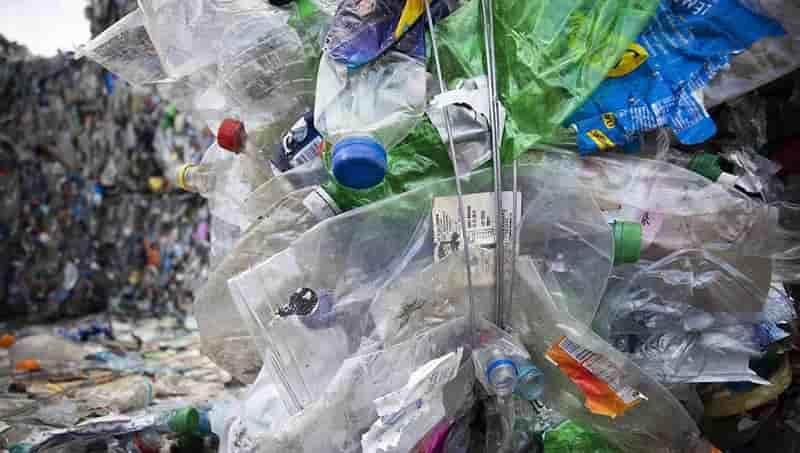Plastic packaging recycling 22-03-2023 - Arhive
Plastic packaging recycling
-85% of plastic is not recycled because costs exceed new material
Despite the recycling campaign, especially bottles, in the US only 5% of more than 50 thousand tons will be recycled in 2021.
Around 85% of plastic packaging worldwide ends up in landfills and is not recycled. In the United States, the world’s biggest plastic polluter, only about 5% of the more than 50 million tons of plastic waste produced in 2021 will be recycled, according to Greenpeace. Plastic originates from petroleum or natural gas. Contrary to the image that many people might have, recycling is intense and growing, in fact costs are high, and recycling plastic is more expensive than buying new.
Global plastic production will triple by 2060 and plastic materials will multiply as a source of pollution in the oceans, where they severely affect marine life. And eventually they return to humans, in the form of microplastics that contaminate fish and shellfish and are ingested with them. Plastic packaging recycling
Pledges from major plastic producers such as food companies Nestle and Danone to promote recycling and include more recycled plastic in their bins have largely disappeared. No data for Argentina. Several beverage brands run campaigns claiming that their bottles are made from recycled plastic.
The global plastic lobby, along with superintendents in First World countries ranging from Austria to Spain, often shirk this responsibility by lobbying against plastic bottle schemes.
New universal standards for plastics are being developed to optimize production, use and reuse.
Seven types of plastic material
Most plastic packaging is made from different types or “grades” of plastic that are incompatible with each other and expensive to separate and recycle. In addition to PET, terephthalate or polyethylene, which is the world’s most common plastic labeled 1, and high-density polyethylene (HDPE), which carries the symbol 2, five other types of plastic can also be collected, but are rarely recycled. Conservatory. Plastic packaging recycling
PET is the most recyclable plastic. Harder plastics, from 3 to 7, do not have a wide market because of their cheapness. “It’s hard to reprocess all kinds of plastic,” said Lisa Ramsden, a plastics specialist at Greenpeace USA. He explained that mixed waste recycling contains a large amount of contaminants that make plastic non-recyclable.
“Recycling is not the problem, plastic is,” explained Ramsden. While new virgin plastic is often cheaper than recycled material, recycling plastic is not cost-effective.
Seen in another way, the plastic virgin is too cheap. Plastic resin created from recycled material is undermined by cheaper raw materials, limiting the market for recycled plastic.
The price of virgin plastic depends on fluctuating oil and gas prices. Environmentalists remember that these fossils are often resources. According to Sander Defruyt, who leads the New Plastics Economy initiative at the US NGO Ellen MacArthur Foundation, plastic recycling would be more competitive if fossil fuel subsidies were extinguished.
The bags, or “light packages”, are not recyclable
The problem is not just the bottles. Lightweight bags or packages that keep foods such as chips and chocolates fresh make up about 40% of the world’s plastic packaging, according to Defruyt. Plastic packaging recycling
Known as “flexible packaging”, they are single-use, lightweight and multi-layered. They usually involve 215 billion products in the UK alone. Only five European countries attempt to recycle these packages, DeFruyt noted.
Part of the problem with these bags is the multi-layer composition, which is sometimes lined with aluminum foil, which was very expensive to break down into recyclable parts. The flexible packaging is often also “super contaminated” with waste food, which also makes it impossible to recycle, Defruyt noted. A typical case is an empty bag of potato chips. Oily and multilayered, recycling its plastic is actually impossible.
The packaging industry claims that “flexible packaging” has environmental benefits, as it is lighter than traditional materials and causes fewer emissions during transport. At the same time, they keep food fresh longer. In a 2022 survey of more than 23,000 people in 34 countries, nearly 80% support banning types of plastic that cannot be easily recycled. The EU has taken some steps in this direction, banning 10 individual products from using plastic.Plastic packaging recycling
The problem of plastic pollution, the use of which has multiplied exponentially in the last few decades, seems to have no end in sight. It is clear that if it is difficult to solve the problem of the rich in the European Union, it will be almost impossible for the developed or emerging countries to oppose the problem.

